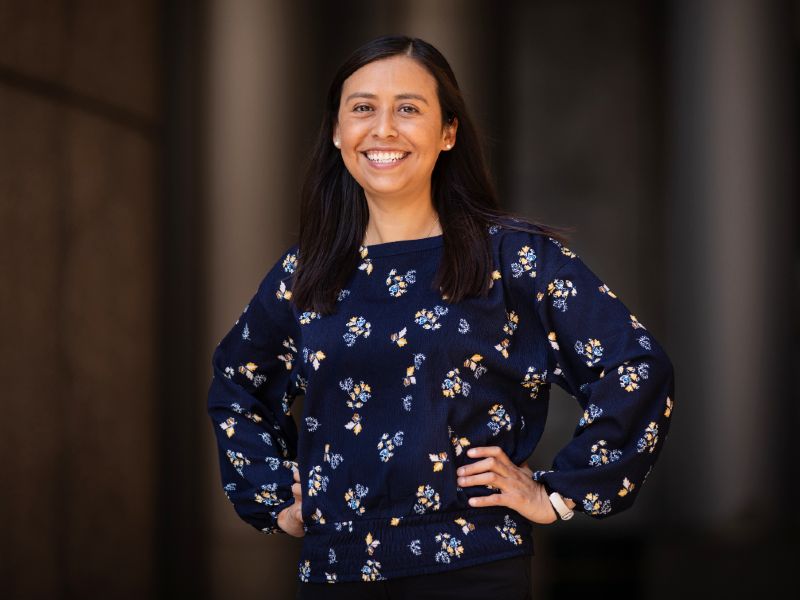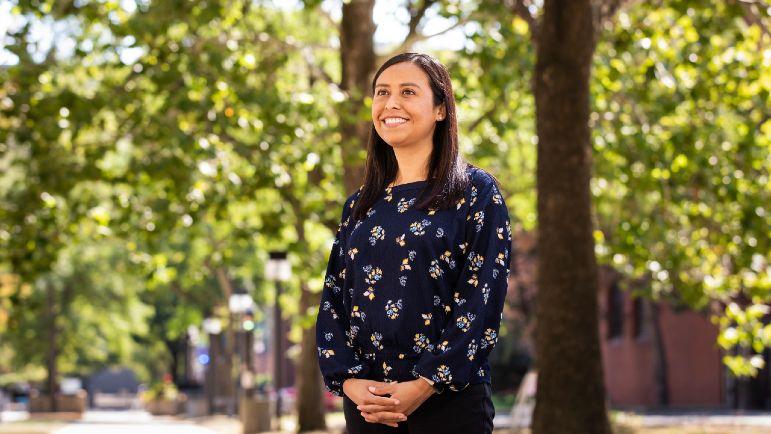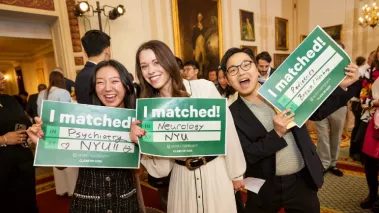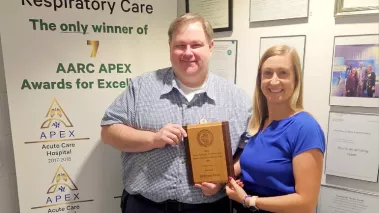Laura Rios will never forget the day she learned that her work options would no longer be limited because of her citizenship status. She heard the message loud and clear.
Now, as an audiologist-in-training, Rios wants to help people clearly hear similarly life-changing news, as well as ordinary, day-to-day sounds.
Rios, entering her third year in the Doctor of Audiology program at Rush University, wasn’t able to pursue her health care career goals until the Deferred Action for Childhood Arrivals program was implemented in 2012. She recently talked about the experience of leaving Mexico as a child to immigrate to the U.S., the challenges she faced along the way and why she picked Rush to help her realize her dream.
Tell us about your background.
Laura Rios: I was born in Mexico and spent most of my early childhood living in Ticuman, a small town in the southern part of the country. When I was 9 years old, my parents immigrated to the United States. My dad was traveling to the U.S. prior to that for work, and he would save money to go back to Mexico. My parents decided it was better for us all to go to the U.S. as a family. We knew the education opportunities were better there. Both of my parents grew up in a very poor environment. My mom and dad were only able to complete elementary school. They wanted better for their children.
We moved to Chicago and lived in the Uptown neighborhood. There were already a lot of immigrant families there. My parents had relatives who were established in the area, so we felt good knowing they would be able to help get some type of housing set up for us. We were starting from scratch.
From there, I started learning English as a second language, and I had great teachers in elementary and middle. They highlighted the importance of education and helped me become a lifelong learner. I went to the University of Illinois at Chicago to get an undergraduate degree in teaching Spanish, with a minor in English. I taught Spanish in high schools in both Chicago and River Forest for six years.
How did you end up pursuing audiology?
LR: Teaching is not what I thought I would be doing. I developed a love for science and technology while attending Lane Tech High School. I wanted to do something in health care. But when it came time to apply to college, that's when I learned that being undocumented meant my work options were limited, especially when it came to financing my education. I couldn’t apply for federal loans. I knew that wherever I decided to go had to be a college I could afford and had to be a place where I was going to feel comfortable.

UIC worked with students like me in the past. They were able to provide some assistance. But at UIC, I had to find something other than health care that I really liked, because there was no way to finance programs related to health care. I love language, so I decided on a program for teaching Spanish.
When I graduated, I volunteered and worked in after-school programs, but I wasn’t able to work as a teacher until President Obama enacted the Deferred Action for Childhood Arrivals program in 2012. I grew so much as a person when I worked as a teacher, but I slowly began to realize I wanted to go back to school to do something in health care.
I began taking courses in speech-language pathology and came across a couple of audiology courses. That seemed like a good transition because I because I already had a degree in language. I wanted to continue using the skills I already had. I decided to go to open houses for graduate programs in speech-language pathology and audiology. I gravitated toward audiology immediately.
DACA’s future continues to be debated. What did it mean to you to be given that opportunity?
LR: DACA is what helped me start my career. I waited a long time and worked so hard in school, and it wasn’t a good feeling knowing I couldn’t work. It was a really powerful, important moment for the immigrant community. It allowed me to be able to provide for my future.
It has been hard to see friends and family go through the ups and downs that the policy has gone through in recent years. They have families to provide for. As a community, we’ve gone through so much insecurity and sadness.
When that opportunity opened up, why did you choose Rush to continue your dream?
LR: I remember just how welcoming everyone was. I was able to identify with Rush because it was a very diverse environment. I had options at other schools, but they never felt the same that Rush did.
As an educator myself, I knew that the environment you're surrounded by is so important in terms of learning. There's a lot of support and structure here.
What do you see yourself doing after you graduate?
LR: I'm currently doing an internship that allows me to work with both pediatric and adult patients. As I get more and more experience in the field, I feel very strong about making sure my post-graduation work is in a hybrid setting that allows me to work with both populations.
My plan is to work in a hospital setting in an urban area where I can use my ability to speak Spanish to help patients. I’m really looking for settings where I can utilize my Spanish every day and use my teaching background to counsel and guide them through rehabilitation, and make sure younger students are receiving the services they need to be able to excel in school. Hearing loss can really impact a child’s learning, and I want to work with teachers to help them understand why.
What would you say to someone who might be following a similar path?
LR: When I was younger, I wish I would have known I could still find a way to pursue my dreams later in life even though there wasn’t a clear path for me as early as I had hoped. So I would tell people that if you are really excited about the possibility of something but can’t act on it immediately, just keep working toward it. Don’t be afraid to jump back in whenever the opportunity arises.







